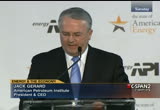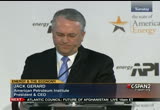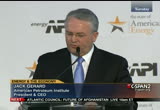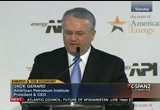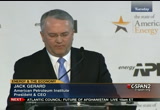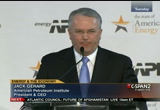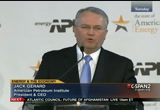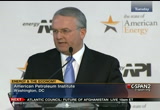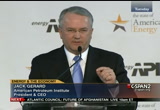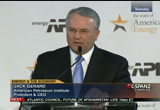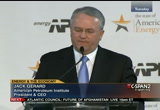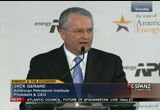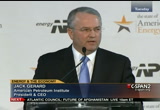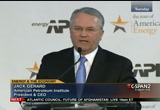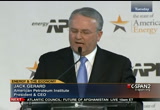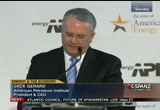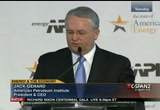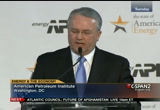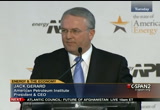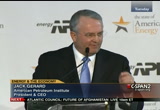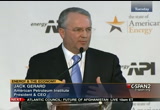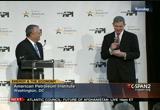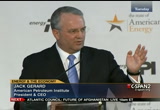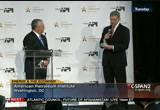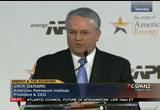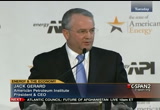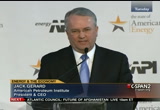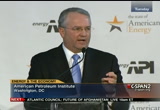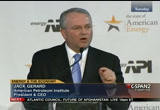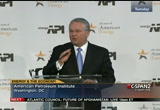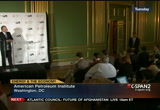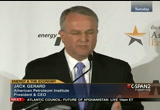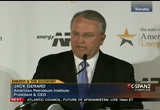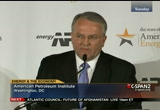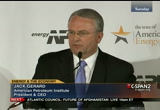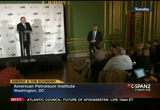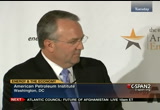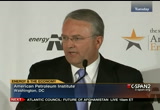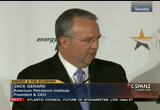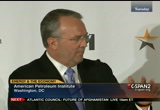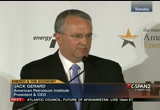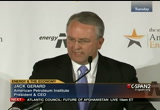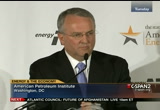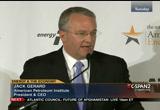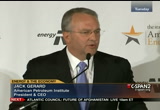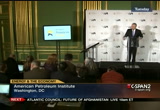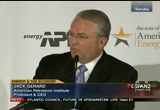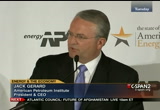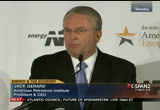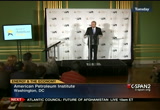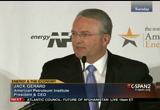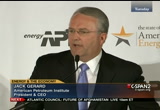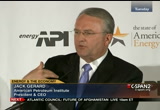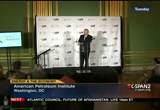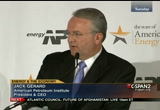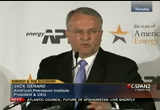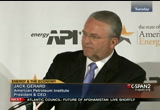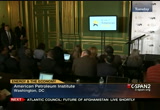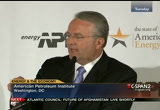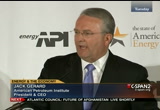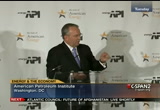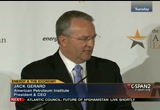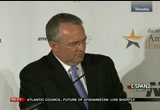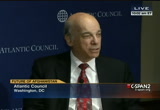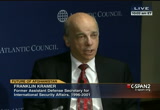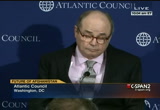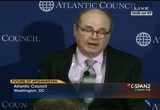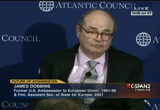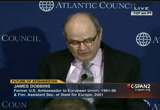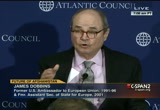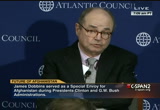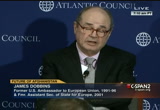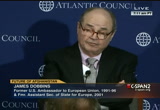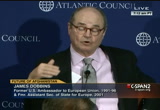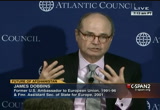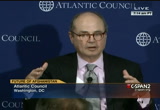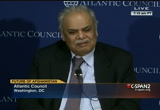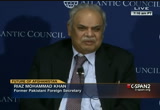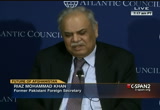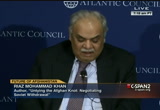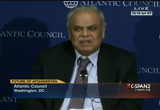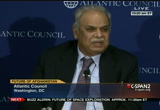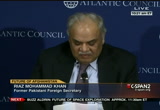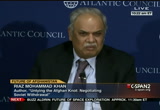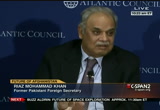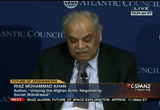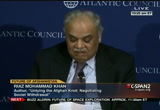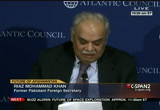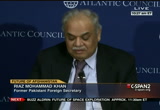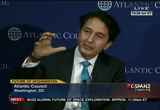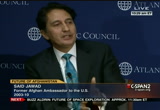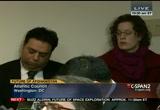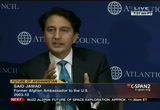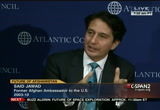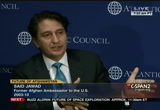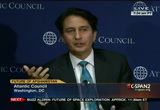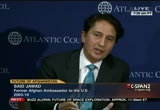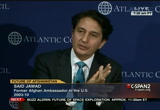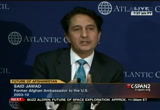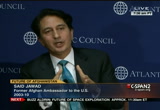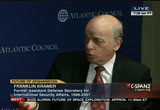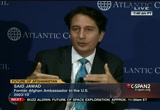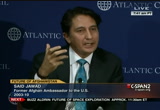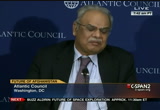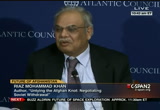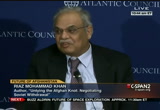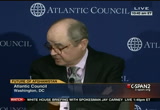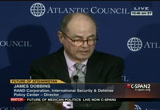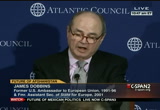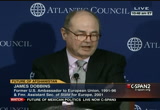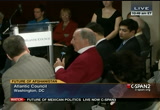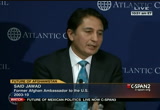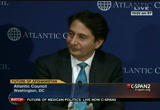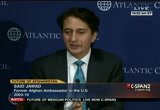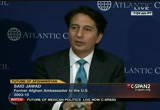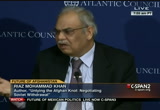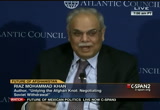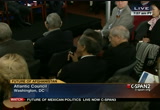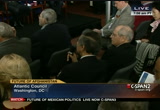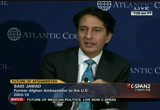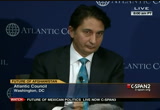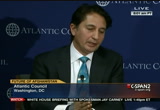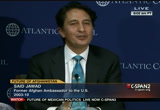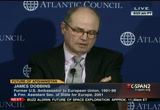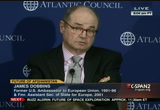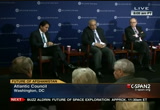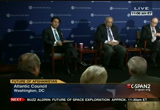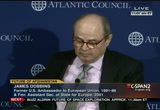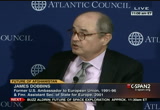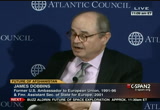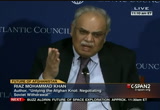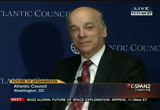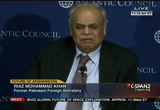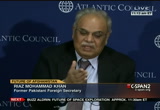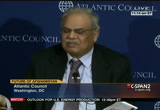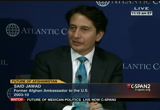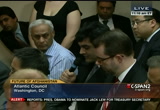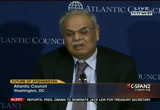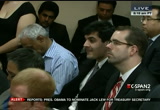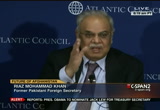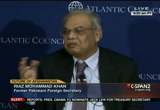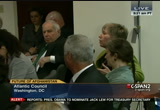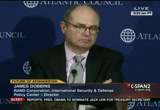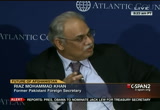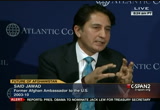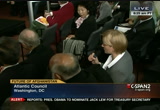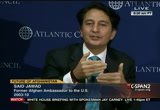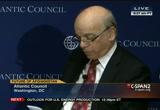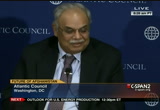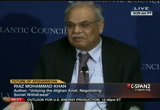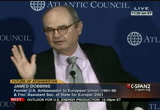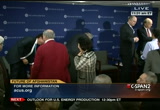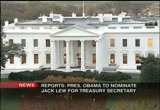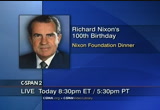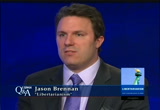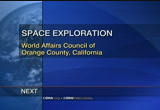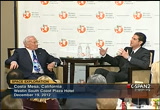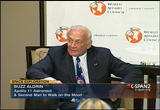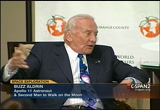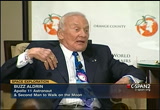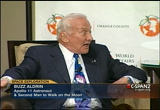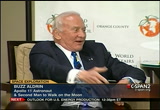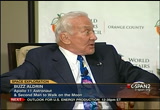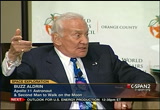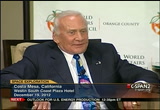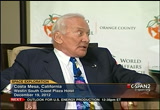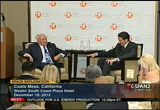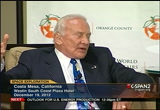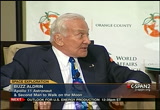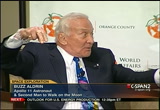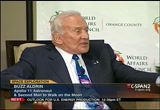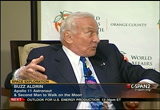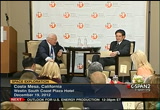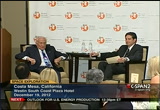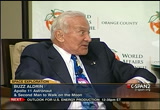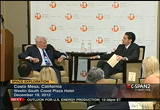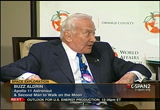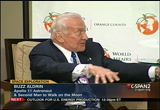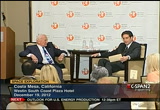tv U.S. Senate CSPAN January 9, 2013 9:00am-12:00pm EST
9:00 am
shift products that are vital to our way of life. be abundant and affordable supplies of energy from shale oil both natural gas and oil are driving job creation and economic growth clear across the country. .. producing more domestic energy provides opportunity for the u.s. to increase exports and serve new market. the recent new economic consulting study from the
9:01 am
department of energy concludes an exporting is a net benefit in all scenarios evaluated and more exports increase those benefits. just a few years ago, as we all know, we were considering lmj terminals to import natural gas to the united states. what a difference a few short years make. by developing new technology to access potential new sources like oil shale, which often goes not talked about, we will be able to dramatically increase our energy potential and role as the global energy leader. oil shale in the western united today is estimated at 800 billion barrels, which is nearly three times the proven oil reserve of saudi arabia. as the numbers clearly show, we in the industry are investing in
9:02 am
america's future. and we'll be sharing what that means through a new campaign we are launching over the next few weeks, which will focus on raising understanding of the unique and foundational role of the u.s. oil and natural gas industry and what it means to our economy. what it means for our communities, and for o- america's lives, for revenue, for refining, and what it means ultimately to job creation and economic recovery. oil and natural gas companies support 9.2 million jobs and could easily support an additional 1.4 million jobs by 2030 through the inindustry's investment in energy production and refining. if they create new construction jobs almost immediately, while striding job creation benefits for many years to come, consider, for example, the
9:03 am
keystone x l pipeline, a pipeline that doug walter and many others are keenly interested in which would immediately create 20,000 jobs with the development of the canadian oil for many years to come could support hundreds of thousand of jobs over the next few decades. the new analysis by ihs demonstrates the benefit of jobs for what we typical call the unconventional oil and natural gas development are not limited to the typical oil and natural gas states. within the past decade, more than thirty states have seen at least a 50% rise in industry supported-employment. from i. t. to accounting to software development to machines and equipment, companies and workers in every state are with supporting the development of the u.s. oil and natural gas industry and thousand of workers in almost every state are part
9:04 am
of this vast networking of u.s. companies supporting the development of canadian oil sans. a recent survey shows the keystone x l pipeline alone created unemployment and activity in 49 of our 50 states. hawaii, unfortunately, we could not find activity, but those who would like to volunteer to help us pursue that further, please let us know after our comments today. the u.s. refining industry alone supports more than 500,000 american jobs, with an average north income of $95,000 an employee, and supports nearly 2% of our gross dmerveg product. -- domestic product. in 2011 china unfortunately surpassed the united states as the world's number one manufacturer. but we can reclaim that spot if we ensure our own energy
9:05 am
revolution continues to gather strength. they can and is returning to the united states. shell, dow chemicals, represented by -- u.s. steel represented by tom gibson here today and many others are announced or considering moving manufacturing back to the u.s. or planning expansions here at home for the first time in many years. these decisions are driven by the availability of reliable and affordable energy. by the knowledge that we have a skilled and productive work force right here at home. the oil and natural gas industry offers tremendous employment opportunities to meet the changing demographics for the african-american community and the latino workers. the issues we've been working on with esther and don at the
9:06 am
department of energy. the recent ihs study projected with prodevelopment policy 166,000 new jobs created just in our upextreme sector by 2020 could be held by minority workers and more than 285,000 new jobs by 30. 2030. for our industry and for the millions of americans who were still looking for work. with up to half of our oil and gas industries technical personnel turning over over the next seven to ten years, our industry provides an important opportunity to address the challenge of high unemployment. but a key part of that solution, as we all well know, is government policy. that enabled the m3 of domestic
9:07 am
energy production to continue on. and maintains a strong domestic refining sector rather than discuss couraging it. -- discouraging it. u.s. oil and natural gas companies are providing more than jobs and democratic drove in areas we often overlook or don't think about. for example the success of the industry means enhancing our energy security, our economic security, and national security. millions of americans gain retirement security through shares of oil and natural gas companies held in retirement savings, 401(k) plans, and pension plans. a study of the largest public employee pension plans we're talking here now about schoolteachers, firefighters, policeman, a study of the plans in seventeen states show that oil and natural gas stocks,
9:08 am
which on average made up 5% of the funds holdings contributed as much as 15% to the total gains between 2009 and 2005. a similar look at colleges and universities found more good news. u.s. shares of oil and natural gases company stock boosted the overall performance of public and private university endowment outperforming every other asset class examined. 11.5% returned between 2001 and 2011 was 326% higher than the average annual tenure return on all u.s. stocks. it leads to financial security, family security, for all americans. this industry is also among the largest sources of rev out in government provided financial security for our nation as a
9:09 am
whole. as a government's -- in the gulf of mexico illustrates tremendous revenue flow to government true the sales, royalty. today the oil and natural gas industry contributes $84 million a day to the federal government. 1.8 billion raise -- could significantly increase if the more than 80% of the offshore area that are currently unavailable were made available for production. energy access not taxes is the key to unlocking new revenue for the government. more than 800 billion additional dollars could be generated through 2030 through access to areas off limits and other prodevelopment policies.
9:10 am
there's a new energy reality for the united states, a reality of vast domestic resources of oil and natural gas. the reality that is our energy supply is no longer limited, no longer foreign, and no longer finite. it's now american and abundant. greatly enhancing our national security. we have a game-changing opportunity to make the u.s. the global leader in -- energy. if we seize the opportunity now, we will be positioned to lead for decades, and realize the economic and energy security benefits of that leadership. the world is watching. our decision will impact -- regions around the world, middle east, europe, asia, and elsewhere. we will encourage by president obama's 2012 campaign comments
9:11 am
supporting an all-of the-above agenda on energy and his statements outlining specific support for oil and natural gas production. we need more energy ever all times. even as we dramatically expand renubility energy sources and increase energy fossil fuels continue to have an important role to play. not only does natural gas have an increase role in electrician generation it provides the raw materials to manufacture wind turbine, and solar panel. it's a backup power. a future of abundant domestic energy is already being made real through today's oil and natural gas industry investments. in cutting edge technology, to our resources previously thought unreachable. with unconventional resources
9:12 am
soon expected to produce the majority of american's energy we may soon be calling them very conventional. shale energy development has been a game changer for communities, the economy, and even our environment as increased use of natural gas has reduced co2 emissions in the united states to 1992 levels. since 1990, the industry has invested more than $252 billion in improving environmental performance of our product, our facilities, and operations. between 2000, and 2010 the amount of investment and technology to reduce greenhouse gases was $71 billion. compare that to the $43 billion spent by the federal government over that same time. compared to all other industries
9:13 am
combined which were just slightly larger than our industry invest the. refinery invested have invested more than $127 billion since 1990 to produce cleaner fuels and meet the growing of variety of state and federal mandates. the complete transition to tier two gasoline is estimated to have resulted in the reduction of tail pipe emissions by cars and light duty strucks, the -- trucks, the equivalent of taking 164 million cars off the road. through increased efficiency, we are doing more with less. america uses about half as much energy today to produce a dollar of gdp than it did in 1970. america's oil and natural gas industry has a unique and
9:14 am
foundational role in our country. providing the fuel of power our economy, creating jobs and supporting our national interest through the industry's investing in america's future. this is a uniquely american movement. private investment and domestic oil and natural gas and the technologies to access those reserves has brought us to a turning point that is unmatched anywhere in the world. not because they don't have oil and natural gas, but because we have brought our entrepreneurial spirit to the energy discussion. to take a chance on new wells, new technique, and new technologies that provide the energy, the -- that sports or way of life. we are at the cross roads of a great turning point our nation's history to realign the energy access toward the west and in to
9:15 am
our own control. north america can become self-sufficient in liquid fuels in twelve short years. another potential energy exporter we can help bring stability to the geopolitics of energy to say nothing of the positive impacts increased u.s. supply would have on u.s. businesses, workers, and the communities which we live. these investments and benefits don't occur in a vacuum. as washington's elected officials and opinion leaders search for common ground on fax policy, fiscal policy, and regulatory regimes, we need to focus on solutions that will support our ability to provide for secure american energy future. there is room for agreement. we welcome president obama's campaign promises to support oil
9:16 am
and natural gas development as part of a truly all of the above energy strategy. we can offer solutions to some of the most pressing issues that will impact our economic future tax reform, infrastructure improvement leasing and permitting on federal land, and regulations that don't add unnecessary layers of compliance burden on top of the existing. and ensuring regulations will comprise our ability to grow the economy and create jobs to domestic energy. and there's plenty of work to be done as we all know. our economy has struggled to recover. millions of americans are still out of work, and millions have stopped looking for work all together. agree geopolitical tear -- many americans wonder if washington
9:17 am
can work in a bipartisan manner to solve the most pressing issues of our time. i believe that we can work together, i believe that we must. if we are to ensure domestic energy is available to provide the foundation for revitalizing our domestic economy. thanks to the vast u.s. energy resources, the oil and natural gas industry stands ready to continue the investments made in jobs, communities, technology, the environment, and safety while improving america's energy security. we are truly investing in america's future, and we look forward to the opportunity tow do more. thank you very much for your attention. i'd be happy to answer some questions. thank you. [applause]
9:18 am
[inaudible conversations] i'll use this mic. >> we have reversed the roles today. can you so? >> is this on now? >> okay. i promise i didn't write any of these questions. i'll ask you a few questions. first is a two-part question. the most important. the congress do to help achieve the vision you laid out today and the most important thing the administration can do and. >> i think for both, the first most u important thing do is do no harm. what, i mean, by that is to don't unnecessarily overreact and do anything that would imimmediate 0 -- impede or discourage what we see going on state by state across the country today. i have to do, and i keep going back to north dakota, it's one of my favorite. if you look at what happened there over the last decade nobody predicted this. today the unemployment rate in north dakota hoovers around
9:19 am
2.9%. the particular the younger individuals come together work force is double what the average north income for the state of north dakota. there's a huge opportunity, we encourage the legislation and administration to do first, do no harm. we should look at the model of the states, north dakota, colorado, pennsylvania, where thousands and thousands of jobs have been created over the past few years. as a result of this vast resource that we have now uncovered through modern technology. so that would be our first encouragement. the second is, if we get the policy right, this is a game-changing opportunity for the united states. not only to make a -- secure the nation we can literally reshape as many of the reporters in the rooming have talked about the
9:20 am
geopolitical dynamic of the world. asia, middle east, europe, and the list goes on. we have the opportunity for the first time in our lifetimes to change they by moving the access of energy power here to the united states making us energy secure as a nation. allowing us to create hundreds and thousand of well paying jobs. it's done by encouraging the economic activity not by discouraging it through tax politician and overregulation. do no harm and think positively is what contributions we can make to the society and economy as a whole. >> all right. you mentioned tax policy a couple of times. what effect would removal of energy industries subsidizes have on domestic energy production in the u.s. economy or general? >> let me correct the first mit. -- myth the oil and gas industry
9:21 am
gets no subsidizes. we get constant recovery measures much like many other businesses getted in the tax code. the impact on the industry by increasing the cost of production and doing business in the united states is not positive. our economic analysis done by third party smart people point out so you two choices, really. you can go down the road of allowing the economic activity generating hundreds of billions of dollar to the government by increasing the activity, job creation, new taxpayers, or you can take the alternative route by trying to extract new revenue from the industry by increasing their cost to do business. the opportunity do develop the resource create new jobs and jen rave new -- generate revenue. they are higher with this path than punitive tax measures. as i pointed out earlier today, the oil and gas industry
9:22 am
contributes $86 million a day to the federal government. our effective tax rate is 40%. that compares to 26% for other standard industrial companies. we not only pay our fair share, we pay more than our fair share. of which we're happy to do, but allow the industry to do what it does best, create jobs, generate revenue, that's the way to contribute to the fiscal conversations of the country the revenue needs and demands. not by discouraging us we punitive tax policy. >> speaking of jobs. i'm not from the state where there's natural gas or isle drilling -- oil drilling activity. do the job figure and economic benefit include states and areas without producing wells? >> clearly the answer is yes. what we found in some of the statistics i cited here today
9:23 am
and whoever asked the question, i would be happy to share in greater detail we found. clearly across the country, the keystone pipeline being a good example. we found new economic activity job creation in 49 of 50 states through the one pipeline. when you look at the breadth and scope of our industry every year contributing $545 billion in capital investment, wages and dividends, it clearly impacts our entire economy and clearly impacts every state. i think some would be surprised to know the impact of our industry on states that are considered or not considered traditional oil and gas states. the state of minnesota i know with a new senator came out to north dakota and saw the minnesota license plateds in the parking lot, everything that is taking place in north dakota. you see this clear across the country. the oil and natural gas industry is a very significant investor.
9:24 am
and we impact the entire economy, i think we can show you state by state that impact. >> a little bit of recurring themes here. i think what i think is the final question. a great deal of media that the u.s. could be the largest oil producers by 2020 overtaking saudi arabia. question about what it's based on. more importantly, current land access and production levels, can't we reach that by 2020? what would be the biggest hindrances to getting there? >> there's a number of answers to that. first, the comment about achieving the oil producer woil world in the 2020 comes comes from the international energy administration. it doesn't come from the industry it comes from the experts that look at the industry. they have predicted that the energy policy in the united states is handled well we could surpass saudi arabia as a ?urm one producer in 2020.
9:25 am
eight short years. the resource in the united states is vast. as i mentioned in my remarking, oil shale alone in three western states is three times the proven reserve of what saudi arabia hold today. the key is access the ability to develop it, define the technology to extract it for domestic consumption, and potential export as away look down the road. the hindrance to us today is look at, i believe, governmental policy. we need to do what the starts have done on state and private land. north dakota being a perfect example. you can see it in colorado, you can see it in pennsylvania, governor of pennsylvania talks about creating over 85,000 jobs over 18 months in the state of pennsylvania. it's on private and stand land. if federal policy mirror the example what our governors are doing, it would be a
9:26 am
game-changing opportunity. today over 85% of the outer continental shell is off limits even for industry to look and seek to find what is out there. permit and leasing on shore, on lands, and federal lands united states is down. this is what policy really matters. if we do it well, we have the potential to achieve all that's been talked about by exports -- experts around the globe, the united states could really have a game-changing opportunity too perhaps dominate the energy equation for decades to come. but we have to make the right choices, we have to pursue sound public policies, and by getting those policies right, question achieve that potential as a nation, put our people back to work, and worry less about some of the geopolitical instability around the world.
9:27 am
>> so i understand we got questions from twitter. i'm not sure what that means. [laughter] >> he's not the social media guy. can you tell? [laughter] >> i'll explain to you later. >> thanks, jack. >> one of the greatest threat of production and refining of energy. you talk about production on the refining side you might want to focus on. >> i see some of the great refiners represented here today. huge opportunity 500,000 jobs in the u.s. today with the refining sector. it institutes over 2.of the gross domestic product each year. we meet the demands of our society and fill the law -- modern technology and expansion of existing footprints. but we also have potential to to be age energy exporter in a significant way in the long-term. we need to look at the options. we should consider the newfound vast energy resource the same
9:28 am
way we consider any other product we have in the united states. we need look to the future and say what policies will make difference, can produce more refined product here and make it available around the world. anything we contribute to the supply equation obviously puts down pressure on price. we have to get it right we need to change our way of thinking. for too long we have approached energy as a matter of scarcity and having finite limitations on it. that's not true anymore. and that dynamic is just changed recently. we should be more thoughtful and understanding we have a vast resource. we have to take advantage of for the benefit of all americans. >> right. i'll close with that. let me thank you for being here today. we look forward to working with all of you as we pursue sound energy policy and we look forward tow working with you as you show us the north dakota
9:29 am
model for the rest of the country. thank you very much for being here. we appreciate it. [applause] >> thank you, thank you for being patient today. i'm sure you have heard our remarks. eric, do you want to call on folks so i won't have to be the bad guy? >> right over here. state your name and your . >> jim landers of the morning news. you mentioned a few times in your speech the potential oil shale in utah, colorado, and whatnot. i haven't heard much about that lately. are you anticipating something in terms of cost break on that? or what is coming? >> no. there's nothing new to report on that other than, jim, to point out potential for vast energy
9:30 am
resource here in the united. a lot of people don't realize the breadth of the scope we through modern technology and breaking technology of or dison tal drilling. now it's economic. we think about oil shale, t good reminder and antidote factor those three states alone, utah, wisconsin, and colorado, we after potential oil three times than saudi arabia with the proven reserve. the simple message is not that any breakthrough occurred. we have a great future opportunity in lots of different ways by continuing the investment and technologies in the potential development for the resources. that's why we mentioned it. >> hi, penny. [inaudible conversations] i wanted to ask you you mentioned hydroic infrastructure
9:31 am
sppg that specifically what you were talking about? what is api doing to get their message out about it especially in light of the film "promise land" and some of the debates going out there. >> we're active. as i mectsed earlier and to restate it a combination of hydroic hornet l drilling has been a game changer. indeed around the world. we have identified vast resources that can be produced in an economic way. -- ohio, nevada and the list goes on. the governor's have already moved to regulated the t.j. we welcome robust, appropriate regulation. we discourage duplicate regulations can create conflict
9:32 am
and disincentive to produce the nation's energy. when it comes to hydraulic. we have opportunities going on in 11 states to continue to educate around the breakthrough technology and part of the game-changing opportunity. we say technologies plural, we don't refine and develop not only those technologies but many others. >> thanks for doing this, jack. [inaudible] >> good to see you again. >> you mentioned keystone pipeline. i wonder if you have an assessment whether or not president obama will approve or reject the pipeline. if he does reject it what would the political consequences be? >> we are hopeful he will approve it. we're encouraged what we're learning from the white house the latest report coming out of
9:33 am
the nebraska. the governor has to make a final decision there and advance it to the department of state. we're hopeful the president will approve it. when you look from the jobs perspective of the energy needs of the united states, as prime minister harper said, it's a no brainer. we're hopeful the president will step forward. i think it's the indication of the commitment based on the promise to the american people. had he said he would be part of the truly all of the above energy trait strategy. it keystonepipe line could be an early test or signal. we're hopeful what he lived up to what he promised the public. today over 70 prptd of the american people believe we should expand and develop more of the natural gas resources. clearly he would be on the side of the american public and consistent with what he promised during the re-election, and frankly, it's good for the nation. we're hopeful we will approve the pipeline from our advantage
9:34 am
point, sooner rather than later. >> all right. let's take a question from the phone. i understand we have one from the phone. now to test our technology. [inaudible] >> you're live. >> peter? >> we can get back to that. why don't we try another question other here. >> hi, john. what is your reaction to the problem that is happening in the arctic, does it show that drilling can be -- cannot be done safely in the region. >> great question. let me distinguish one thing what's going on in the arctic
9:35 am
right now. what occurred is a transportation incident in high seas and rough waters. it was unrelated to the direct drilling activity, as you know the drilling activity on the past summer was successful to the extend they were able to accomplish it before removing a lot of assets. i think the most important thing is distinguish that the incident was a transportation movement situation. it was as of now they have safely have in harbor. there have been no environmental impact, no adverse impact to human beings. so as of now, be it appears things are under control. we'll have to see as things develop. >> david grant, "christian science monitor." you -- the need to avoid punitive tax measures and lot of members are high effective rate payers in term of the corporate income tax. i was wondering if you could sort of talk about tax reform a
9:36 am
little bit, whether you would be think it would be a good step toward to exchange the cost step for lower effective rates for energy producers. if you could say two words and two sentences what you expect out of tax reform, if anything in the coming year. >> great question. of course, it's very timely in the current dynamic as well. let me state from an industry stand point. our view is we should not be singled out for punitive tax treatment. there have been proposal where they identified in some instances more companies. that said we should change the tax code. it's punitive. it's not good policy at all. it's punitive designed to punish. we think the alternative approach is if we're going to have a corporate tax reform discussion, we're prepared to enter to that discussion, we'll be able the table along with
9:37 am
everybody else. it should be a comprehensive reform. we should look at the impact on u.s. companies and their ability to participate and compete on a global scale. so clearly the lower you get that rate, the more competitive it makes us. the higher the incentive to bring the dollars to invest here in the united states. our companies are large because they have to compete on a global scale. they primarily compete against foreign governments. when they look around the world as to where their going to invest the resource, they obviously look for the most competitive place. anything to bring that corporate rate down to incentivize the investment dollars to return to the united states or put more of them here, is a positive. so we're happy to have that conversation, we expect to be part of that table in a comprehensive way. not in a punitive way. not to single out one industry to say, well, their earnings appear to be high. let's take the resource.
9:38 am
that shouldn't be the standard. the standard should be how do we have a positive, uniform, tax code that encourages economic activity to create jobs, create more taxpayers, and openly generate more renner ref new. i as i mentioned before, the analysis shows you generate more revenue to government by allowing the economic activity to occur than you do by trying to penaltyize an industry in raising their cost and discouraging the very investment you're trying to encourage to generate the economic activity. so that's our view on tax reform. i think it's unclear right now whether or not we will have corporate tax reform. the fiscal cliff deal in the con test of that dialogue and the need to raise the debt ceiling and focus on spending cuts, it will be interesting over the next few weeks to see where corporate tax reform falls out
9:39 am
of that conversation. >> i'll make my way over here in a moment. >> david -- [inaudible] can you tell us what is your top legislative priority this year? >> we have a lot of priorities. as i mentioned in the earlier comments, the first one is to encourage government and policy makers to do no harm. if we look at the game-changing opportunity that occurred at the energy area particularly in oil and natural gas today, it's revolutionary truly. our first council as we look to the priority is to say don't do anything that would discourage that investment and economic. when we look at priority we look at regulatory regime. we look to the congress and say what else can we do to open other area of access. we're not talking about national park or sensitive areas. we're talking about areas that have potential for vast oil and
9:40 am
natural gas development. the industry would be prepared to invest billions of dollars to hire hundreds of thousand indeed millions of people in creating new jobs. so our broader priorities fall within that category. how do we take advantage of this perhaps once in a lifetime opportunity to shift the geopolitical dynamic of energy policy to concentrate that back here in the united states? so that is our overarching priority. from that, it breaks out to various issues, tax policy being an important one to the earlier question. regulatory policy, what will the feds do on i had -- i had drawlic. they moved in and regulated the activity for the feds to overlay a second level, that would conflict and perhaps -- duplicate is not good policy. we'll be watching the areas closely as to how they unfold
9:41 am
and make sure we take advantage of the game-changing opportunity here in the states. >> -- compared to the start of the administration. are you seeing more of that not of the re-election has happened are you seeing there's more outreach you're able to get your messages across to the administration. what are you hearing from them? also, i want to know, you talked about expanding access, but with the re-election of the obama administration it would seem it's pretty much off the table, you know, the five-year plan is already done for offshore. they don't seem to be showing any movement toward expanding ax excess. is there a deal that could be
9:42 am
made there? how would it happen? >> well, a lot of questions there. let me try to remember them all and respond accordingly. first of all, there's lot of opportunity to change policy to encourage the development of u.s. resource. it doesn't have to occur within the administration. the lands act authority in the administration the congress could act. there is already -- talking about need to expand the potential opportunity. you have bipartisan support in the state of virginia, you have talk up-and-down the south atlantic and potential opportunity to look in the area, to develop the resources. you see the new chairman of the energy committee who is talking about a revenuing sharing proposal very early on with senator mor cow sky. these are significant shifts in policy that would allow for the responsible development of the nation's oil and natural gas. it doesn't rest within the
9:43 am
administration. ly say over the past few months we had an increased positive dialogue with the administration. i think some of that has comet of that -- come of that as a result of recognizing the game-changing opportunity. it's no longer though theoretical. it's reality. you go to pennsylvania, you go to north dakota, you see the potential this industry provides to our economy, to economic recovery, and job creation. and it is not insignificant. the other thing i might add is the president shifted his policy as it relates to oil and natural gas. you remember a few years ago in the state of the union, he referred to oil and gas as yesterday's energy. throughout the campaign, he gave it a full-throated endorsement of the need to produce america's oil and natural gas. why. that's where the american people are. almost two to one today the american public believe we should produce our own energy resource.
9:44 am
they know we can do it here safely, they see the job creation potential, the revenue generation potential, and the national security implications of this opportunity. they strongly support it. and i think the president did the right thing when he moved back to a position saying you know what? we need to produce the nation's resource. our relationship has improved, and i believe moving forward we will be able to work together and find some common ground. i think that's what the public expects of us as industry, as the administration, and to congress. we're looking for the opportunities to work together. >> i'm -- [inaudible] you mentioned in the remarks choosing liquid fuel dependence and energy dependence in twelve years. how does it jive with your effort to repeal the fuel standard. >> i think it's consistent. when you look at renewable fuel standard. let me back up.
9:45 am
we could be liquid self-sufficient here in north america within twelve years that's what our analysis shows. some people believe you can do it quicker. the canadian, our number one partner believes we can do it as quickly as eight years. it has three components what we refine here in the united states, what we potentially bring in from canada, and of course, the continued expansion and renewable fuels. it's consistent. renewable fuels industry continue to produce their product, we welcome that as you know the oil and gas industry are major investors in renewable forms of energy. our concerns come about with the mandates as part of the renewable fuel standard what we're seeing now is not good policy. we're coming up to the wall, they're pushing for e15 fuels, the aaa has come out to warn consumers not use the fuel. you have automanufacturers coming out say, we're not going
9:46 am
honor your warranty on the car if you use the higher blend of e15. over the past year there's been a lot of conversation because increased food cost, et. cetera, as a result of renewable fuel standard. many industries, the agricultural industry, consume or industries, the restaurant associations, they're all raising concern. a waiver request was made and denied. what it shows is renewable fuel standard mandate does not work. and therefore needs to be changed and repealed to become more workable. renewable fuels are a key part of our energy infrastructure and energy equation in the united states. but not if the system or the policy doesn't work. in 2007 when it was first enacted it was put in place driven by the need to wean us off the oil. today we see that weaning occur pry lair -- primarily due to the
9:47 am
oil production here in the united states. new day, new circumstances, we need relook at the policy, update them, make them more effective, and make them more workable. that's why we're going pursue policy this year to change the renewable fuel standard. >> thanks, jack. peter grant. [inaudible] during the -- do you think arctic in 2013 goals? >> considering what i'm -- i'm sorry i didn't hear. >> with the pacific not in arctic waters? >> do i think they need to what? >> [inaudible] goals for 2013? >> i think, as you point out, the secretary of interior and others shell is being closely watched as they're moving the equipment back and forth as they're looking to drill in the arctic. i think they are not only highly regulated but monitored and scrutinized what they're doing. i think it needs to move forward. it's an perfect example way west
9:48 am
need corporate with regulatedders and make sure the greatest technology is there. but at the same time, allow for the realistic development of the resources. they're being closely looked at and taken advantage of by the canadian, russian, others. the united states needs to be thoughtful about our own interest. that's a perfect example what shell is doing. they're pursuing the opportunities. >> hi, i'm bobby inside epa. the renounal fuel goals what epa policy are you most concerned about in the coming weeks and months? >> in the short term we're working closely with them on a number of things. the riewlt making, we have to make sure the fraudulent not system we manage that risk better. the government needs to step up in that role. so that the program does work does function. you look at the cell mandate on the renewable fuel stand i mentioned per the earlier question. here you have a situation where it is not produced in a
9:49 am
commercial quantity but the epa has a authority essentially tax the industry which is cost us millions of dollars to provide revenue to the government because we don't use a fuel that doesn't exist. that's problem. bad public policy, that's a focus we're talking to epa about. epa as -- we're looking closely at issuesic like two or three fuels approaches. today we have not seen any justification for the proposals. they have put them off for the time being. we're hope cooler heads will prevail and put them off until there's some justification. those have been a few. i have a longer list i can go through great detail and my scientist a longer list. >> hi, bill murray with energy dependence group. aip spent well over a millions of dollars on advertising and promoting the public name and
9:50 am
energy security issues. have you noticed any change of the relationship between, you know, the industry and the -- reputation of the industry with, you know, popular really aty and population that questions the motives sometimes? what is your take on that after the big investment since you've been on part of the organization? >> yeah. a couple of answers. the first one is we are pleased with our success today and ongoing onreach and educational effort. particularly with the american people. the congress is a lagging indicater. the congress responds to those that vote for them and elect them. so the key is to educate the american public and to encourage the american public to speak out. we are pleased with our success to date. we see record high support for the oil and natural gas industry today as i mentioned earlier. now exceeding 70%. you see the american public becoming more active in this debate the more they understand and the potential opportunity
9:51 am
for the country, job creation, economic recovery, all the things we've been talking about. so we're pleased with our dialogue with the american public. we will continue that dialing as i mentioned today. a lot of our messaging moving forward and interacting with the american public will be on investing in america's future. it you look at the vast high numbers of investments we're making, $545 billion a year over a trillion dollars every two years that the private sector specifically just the oil and natural gas industry is invest ing in our domestic economy. it's a big deal. the stimulus program the congress enacted a few years about $700 billion to stimulate the whole economy. we as a industry are doing a trillion dollars every two years. there's broad spub lick support for the oil and natural gas industry. we believe the support will continue to grow. we pleased with the way it's interacting in the public
9:52 am
dialogue. you see senators a new chairman of the energy committee talking about important area to improve the oil and natural gas production. they don't happen overnight. the trends are going in a positive direction. [inaudible] >> we have multimillion dollar programs and we will continue to advance those programs going forward to engage in the public dialogue. >> let's try once again the call in. >> caller: [inaudible] your line is open. >> caller: this is peter johnston from in montana. how big of a role has development of the [inaudible] formation in montana had in the potential sufficient efficiency of the u.s.? what do you expect to happen in the next five to ten years? >> thanks for the question, peter. the formation in north dakota and in to eastern montana that
9:53 am
he's referring those that aren't familiar has been significant. north dakota over the past two to three years set record production every year. and today produces around 750,000 barrels a day. the only state to surpass is the state of texas which produces about 1.1 million. as i mentioned in my opening remarks, north dakota in the past year has surpassed aca -- it will continue to grow not as fast as it's growing today. just ten -- eight to ten years ago north dakota produced about 60,000 barrels a day. now over ten times what it was a few years ago. this is how significant of change the technology has been in terms of the development of resource this specific case of the bakken formation.
9:54 am
>> jean from green wire. you didn't mention greenhouse gas rules of the rules you're working on with the epa. they're under court order to refine it and we assume it will happen sometime after they deal be the power sector. are you confident it won't happen? or do you see no opportunities for reducing gene -- greenhouse gaseses what is your sense and communication at this point with epa on this? i think there are two dimensions. it was merely oversight on my part. it's clearly of concern we believe should be handled appropriately. the second piece i mentioned in my comment we should not overlook the vast production of the nation's natural gas resource today which is resulted in the price coming from about $13 down to three and a half, et. cetera, and the more consumption of natural gas in
9:55 am
the utility and the electric utility sector has brought greenhouse gas emissions in the united states to 1992 levels. required more government mandate, required more government regulation, and simply a matter what the economy produced as a result of producing a cleaner burning fuel in this case, natural gas. so i believe what the epa should do as they look to regulate the opportunity. activity they need to be thoughtful. it goes back to the access. we have a cleaner burning fuel that demonstrating a positive impact in carbon reduction and carbon emission. the oil and natural gas industry is a leader in pursuing zero carb emitting technology. the few we've been allowed to produce in vast quantity is really what is driving that today in reducing the carbon emissions. it should be taken in to.
9:56 am
[inaudible] greenhouse gases withen the oil refining sector. >> we're looking at that and constantly improving what we do in terms of emissions. again, we need to what the emissions are coming from. the electric utility sectors where the vast majority of carbon emissions are looking today. they look at the sector long before the refinery sector cho is small compared to other e milt -- which is really quite a lot small. [inaudible] we're largely a pocketbook nation. a year ago your last native american address oil prices and gasoline prices were approaching record highs. we're seeing national average about $3.30 a gallon right now. what is changed since your last address? >> well, what has changed
9:57 am
continued evolution of this revolutionary opportunity. today more american people understand what is happening in the united states in terms of our energy development potential. hundreds of thousand of new jobs have been created since last year. and more and more are starting to recognize the significant impact that can take place on a geopolitical global basis as a result of what is occurring here in the united states. in talking to one of my friends after our discussion out here today, we happened to be in the middle east rays week, and -- last week and comment what we're talking about here is the topic of conversation in the middle east. it's the topic of conversation in europe. it's the topic of conversation in asia, and why is that? because it's a game-changing opportunity. we literally have the ability, as i mentioned earlier to shift that access of energy power to the united states. the question is will we do it?
9:58 am
we're right on the threshold of making those judgment. it's evolving a positive way, and that's what is changing. you're seeing more and more bipartisan support for the development of energy here in the country. north carolina could become a major natural gas producer. the governor recently elected and asked one of his top priorities. he said to make north carolina an energy state. arkansas, places we don't traditionally think of energy state. -- arkansas has been producing for some time. the opportunity spans the entire country. michigan, ohio, the list goes on. that's what is changing. more and more people becoming aware of the opportunity, and i believe public support for it will continue to grow. >> we have time for a couple more questions. >> chad with ihs "the energy daily." you mentioned a couple of time a
9:59 am
study do you think done from doe and the declining price -- [inaudible] but the newest study said it won't happen today's economic. the prices in the united states are too high or prices abroad too low. considering the number of lg export facilities that have been proposed by high deline rations -- power sector and manufacturing csh -- [inaudible] do you sympathy we are setting ourself up for a difficult situation we need more natural gas but the price isn't as low as it is today. >> well, back to the study. the important thing about the study it reminds us that government should not intervene regulate exportation of the natural gas at this point. we should stay focus oned potential benefit. it should be treated as any other comod -- commodity in the united states. i believe that is what the study
10:01 am
be we have one more question left. >> if united development. >> we have two questions left, just a quick question, if you think that there is going to be more investment from china, the level playing field that these investments are financed positive by the government or what not. >> we will leave this program. just a couple moments left. you can see it entire. go to c-span.org. we will go to the atlantic
10:02 am
council in washington for a discussion with former ambassadors and policy leaders on the future of afghanistan. afghan president hamid karzai is in washington for meetings with president obama. >> involved in people in the audience are involved and we followed up on that work continuously over the last several years. this is the latest installment if you will. we all know that we are at an infection point of afghanistan. a lot of important decisions coming. president karzai is here to meet with president obama. that meeting will take place friday. and shake the contours of that meeting. we have ambassador james dobbins, former ambassador of afghanistan among many others,
10:03 am
and we have ambassador riaz mohammed khan of among other posts was a foreign minister and also investor in china. we have ambassador said jawad, ambassador of afghanistan to the united states all of whom have been intimately involved with respect to issues regarding afghanistan, regarding the region. we called the event back to the future. some people have spoken to me before about this and what do we really mean by that. we will let that emerge as the discussion goes on but we know we have a lot of fundamental issues to talk about, certainly military presence has been an issue that has been talked about in the newspapers a lot with governments and important issue, regional issues, economic are an important issue. technical issues such as what agreements might be signed between the united states and afghanistan are important for the role of pakistan and many others. with that, let me turn to our
10:04 am
three speakers, each of whom will speak for summer between six and ten minute roughly speaking and then we will open up to questions or dialogue with respect to the audience. we will start with jim, if you are ready, give you the floor. >> my response ability for afghanistan goes back to 2001 and is fair to say the time was present for creation of the current regime and i start by looking back and try to spot the things we did wrong at the time and it strikes me there were three fundamental errors two of which i perceive that the time and tried to do something about and one of which i failed to proceed entirely and did nothing about. one was the decision not to deploy any american or international peacekeepers in the country. we have a country with no police force and no army and we decided
10:05 am
security would be an afghan responsibility after the fall of the taliban. i think that was a major mistake. the second was to allow the coalition we successfully built for the war and the peace conference disintegrate. iran had been helpful, rebuffed offers of further help. pakistan had at least been not actively and helpful but we failed to keep them up to that standard in the succeeding years. the third error which i failed to perceive was a failure to pursue reconciliation much earlier than we finally did. there were certain proportion of the taliban leadership that were prepared to be coopted and that would have collaborated new arrangements and instead we send them to guantanamo and send very negative signals to those who
10:06 am
might consider coopting and being coopted into the new system and it took us almost a decade to reverse that policy. nevertheless, despite these problems and despite the fact that now more than ten years on, we are still engaged in a counterinsurgency campaign. we have come a long way than many of us realize and i think some of this is reflected in a recent poll the asia society put out a couple weeks ago which showed in distinction to american opinion about afghanistan and american opinion about america, a fairly high degree of optimism. 52% of afghans think their country is going in the right direction, this is up from last year, not down. 53% of them say they are more prosperous now than they were
10:07 am
five years ago. the reasons that they cite are better security, more schools, more reconstruction. it is also interesting to point out that the non optimistic side, it is not 48%, did worse security as their concern. they clearly are differences interception. interestingly for reconciliation for coopting the taliban and bringing them in the political process is 81%, very high, not that high uzbek in 79% of the
10:08 am
people think the government is corrupt is not just that they were giving pollsters the answers other pollsters wanted, they were quite critical of the government but they also seemed to have a more balanced approach. they can cite the government as on balance better than most they have experienced in their lifetime but at the same time very corrupt and something ought to be done about it. poll that to the presidential election of several years ago showed the same results, most afghans thought karzai's presidential election had been very corrupt and most of them were very satisfied and so they
10:09 am
could hold both concepts which our own media seems unable to do. we recently did a study which puts afghanistan in some perspective, about to be published. we looked at 20 post conflict reconstruction efforts, peacekeeping and peace enforcement efforts, bosnia, kosovo, somalia, iraq, afghanistan, mostly smaller un ones in other places. and while most of them were deployed in the first place. and why they produce more democratization and freedom house wars to rank them. did they produce more, better government and use world bank indices the government effectiveness index enrage every government in the world, did the
10:10 am
economy expand and imf figures, and a lot of the citizens, use the un development index which looks at both levels of income but also education and health and other criteria. in democratization afghanistan didn't pass the peace test and 16 of 20 cases did. that was definitely a failure. in democratization was in the middle in terms of how much was democratized and improved, freedom house score by 15%. in government effectiveness, interestingly and counter distinction to everything we hear about it ranks second of the twenty countries, it had the
10:11 am
second-highest improvement. it improved was the second-highest. per-capita gdp again was second highest, per-capita gdp increased 20% since 2001, and interestingly in human development index it was the highest of all 20, it showed the greatest improvement in human development which is a combination of standard living, education and health, all kinds of criteria. pretty easy to see why afghans tend to be more optimistic than we think they should be and indeed in many cases more optimistic than americans about america's own future, longevity is way up, infant mortality is way down, literacy is up, the number of afghan children in school today stay in school for ten years afghanistan's literacy rate will be three times higher
10:12 am
than it is today. the polls of course in the asia society, didn't hole in some of the areas that were most violent, and so the numbers would be lower in some of those areas so one has to account for that but a number of areas they failed to poll are fairly limited. there was a long story in the new york times on the front page about how the levels of anxiety about nato troop withdrawals, each story is written about the most exposed areas, the areas that were last cleared and will be the most exposed to taliban return and the story is about high levels of anxiety and concern and pessimism and i am not arguing that that isn't correct, just that it is not reflective of the attitude of most of the country so far as it
10:13 am
can be determined. just to end on what we're looking forward to their two transitions coming up, the transmission promote u.s. and nato led combat operation, afghan let operation and the transition from cause i -- karzai government to someone else's government. the latter is the more dangerous and difficult and the more uncertain. i don't think the afghan army is going to run away in 2014, but it is possible the afghan government will collapse as the result of a failed transition. i don't mean the election will be regular necessarily. the regular election could produce a very unstable results. it is at two round system and it is plausible the first round would have 25 candidates that in the first round none of them
10:14 am
would get more than 10% of the vote and you have a second round between two candidates neither of whom had 10%. mathematically one of them would win but would win for 10% of the country. that kind of results would not be enough. i am concerned about corruption in the government is accurate, real, but does mr. point that there's much corruption as formal institutions that hold the country together. karzai has built an effective network that allows him to exert a significant degree of influence across sectarian lines and across geographic lines. formal institutions of the kind that have been built not without some success since 2001 simply
10:15 am
are not up to exerting that degree of control and influence of the big question is can a successor both assume control over the formal institutions of government also have a broad enough patronage, political machine in enough of the country so he will be able to at least replicate karzai's success in this regard and as we tend to evaluate the upcoming transition in afghanistan, that is the question we need to be asking ourselves. >> thanks very much. that puts out a lot of food for thought to say the least. let me turn to riaz mohammed khan. >> thank you. let me say that the year 2012 has clarified some of the
10:16 am
situations we are discussing today. for example there is an improvement of relationship with the u.s. and pakistan that is better coordination between afghanistan and pakistan and also there appears to be better clarity in the u.s. position relating to two very important questions which is withdrawal and negotiation. i offer a few comments based on my experience as part of the foreign office in 2008 and as an observer. i do not have any formal
10:17 am
association. pakistan, several other in the region, have made policy mistakes, pakistan has support, it is not all on account -- there are many other dimensions to the conflict in the region. and they cannot place the blame for all the problems as to others. the first point that i would like to emphasize, to write a bit in the past. several years -- any responsible
10:18 am
person from the union leadership for -- seeking afghanistan, or the taliban as an asset for the future, the foreign minister would be the army chief, rejected these notions but not going to implement details. no question of their returning to kabul or in the 1990s, there are many reasons for this, details or skip it for the moment. there is one thing, pakistan could not treat the taliban as it treated at al qaeda.
10:19 am
this is a point where the demographics and history and cultural traditions will appreciate as much as any pakistani would. the taliban remain part of one political landscape but here there was a disconnect between the pakistani position and the u.s. position right after 9/11. i think ambassador james dobbins has made part of pakistan's relation was not unhelpful. if it was not helpful -- the thing is even at that time pakistan had argued that the taliban should be brought into the fold of the one process but
10:20 am
anyway, that is past. on this count there have been many misunderstandings and i will say the accusations that pakistan has been engaged in, we are dealing -- whether i said pakistan could not be the one taliban leadership, the way it treated al qaeda, now the situation after 2009, the embarrassing -- american retribution, so the situation is different. i would say after a period of certain tentativeness, reconciliation effort appears to be iran led, the way it ought to be. pakistan and united states play
10:21 am
a supportive role. pakistan should be positive and helpful but it should not be eager because eagerness can be interpreted as having its own agenda of trying to interfere, support one party together. at the same time i would say there should not be an unrealistic expectation from pakistan with regard to the taliban. we can persuade them, i would say that generally we have the experience of the mujahedin at critical times accepted for our point of view. the taliban should be free to anyone who stays in pakistan.
10:22 am
and other ones who certainly talked to issues of hospitality and pakistan has to be the future really firm and pakistan or afghanistan should coordinate with each other in controlling across borders. i personally believe there is no conventional threat to either pakistan or afghanistan except the kind of threat that both face on account of the extremists and militancy. finally i have a couple of observations about u.s. forces
10:23 am
and withdrawal in 2014. the question of the u.s. presence has been discussed in washington at the highest level, much depends on the agreement which is a complex political matter for president karzai. pakistan should accept whatever is decided between the u.s. and the iran government. from pakistan's point of view the downside of continued u.s. presence is to continue to provide an argument for militants to justify -- this is the down side. as i said, the u.s. government and the iran government, pakistan -- these are my personal views. usually two arguments which are
10:24 am
made in support of continued u.s. military presence after 2014. that isn't necessary to keep the iran army together and necessary for operations like drones etc.. the first argument that one national army, the iran national army has already shown its ability to withstand effectively any attacks from the taliban -- basically the ran national army shown very effective. no army can go into sporadic
10:25 am
activity -- pakistan army has not been able to do that the these activities do not lead to collapse of the systems and governments, no doubt. so even the transition the ambassador mentioned, the government reform, but here we have to see the system that is in place and ambassador james dobbins talked about the contribution to that. that i don't think is collapse. i personally don't see any reason why the iran national army should not be able to pull on its own without the support of coalition troops, effectively counter any significant -- by
10:26 am
the taliban or any other force. you might recall after the soviet troop withdrawal, to extend the mujahedin forces that were far more organized in that context. it was only after the soviet union collapsed that it fell. as for drones, one comment i would make is this presents a paradox, it served both as the cure and also a cause for aggravation of the valley's and those who have been reading about these notes, to counter extremism and militancy, which is required by pakistan and afghanistan is to address this
10:27 am
challenge and cooperate with each other and also need to fully realize this contribution of this conflict is disastrous for both of them. there is in my view a value after 2014 there is no end of the violence and conflict nitti and quickly, one can hope the conflict offered time. the outside period has a role but that is essentially to help development of the economy. reconstruction and economic development will generate for civilization, the outside players can best contribute and check their rivalries.
10:28 am
sometimes these concerns lead to measures which will compound problems. the iran in my view alone can take care of politics and security in these areas outside world has often compounded problems and there could be many issues like trade policy. thank you. >> thank you very much, very interesting perspective. we will get a lot of questions on that. ambassador said jawad. >> thank you very much. i am honored to be in this panel and appreciate -- i want to make one point clear. whatever i say is my opinion. added not speak for the afghan government or anyone in afghanistan. support and points were raised about afghanistan. i want to put the major transition afghanistan is going through in the macro perspective. what we are facing in afghanistan we are going through a cold transition, going to
10:29 am
political transition and economic transition and social transition and activity transition. every one of these transitions provides its own challenge and opportunities. to the political transition which is the upcoming elections in afghanistan, the good news is as karzai indicated, afghan election commission has put forward a very clear and detailed timetable for the upcoming election. there's a lot of political activity in afghanistan, different groups getting together and talking to each other. the challenge with the political transition is we don't have a political system to prepare institutionally and properly for the transition. that is one challenge. the second challenge is as much as these political leaders in afghanistan getting together and talking to each other, no one is really taking a lead to take a
10:30 am
clear position on national issues because of the uncertainties surrounding afghanistan on one hand and on the other hand as you can expect, president karzai is a sitting president even if he doesn't muzzle iran for the presidency he wants to have the most important influence on determining the succession and outcome of the transition and therefore i don't think he is going to endorse that soon because as soon as he endorses a person or political force he will become that. ..
10:31 am
>> the second transition is acknowledgment. in afghanistan, we are transitioning from the contract economy from a defense into the private sector economy. in the transition is fortunately going much better than thought. i involved in that as far as the work. i travel vertically to afghanistan to a lot of the companies who, for instance, made a lot of money working for major contractors doing for major construction projects in afghanistan, now they are shifting into housing him into other areas come into mining. so they're adjusting themselves and align themselves into the new realities. and, of course, the good ones will survive and there will be some adjustment. there's a lot positive economic
10:32 am
activities taking place in afghanistan. that makes us a lot more, hopefully, transition for take place more successfully. of course, there are impedimen impediments. still difficult. the integration of afghanistan into the region as an economy has its challenges. a lot of those challenges are political, not so much economic. still have issues, still our trades through central asia could be much, much bigger than it is right now. and in both cases it's not really -- it's just a policy that makes it difficult. and, therefore, it is easy to overcome that challenge because we have to have better policies. the social transition in afghanistan is a new generation of afghan, young afghan leaders taking charge of the country. you can see this. used to be when you saw in afghanistan, and i saw when i was into parts of the country, all the complaints was yes, about corruption, a u.s. motor
10:33 am
operation, of the warlords, you name it. now when i travel people are complaining about issues like access to internet is too expensive. this has been introduced among afghans. or to get visas to travel outside afghanistan. all this is good news. people are becoming more connected. and we see the new imaging. just last week the foundation for afghanistan, which i established, brought about 30 students actually to washington into the white house. and when you listen to these kids and in what they dream of and what they want to do for afghanistan, it is very enlightening. but most important transition, which also requires a lot of attention here and in afghanistan is security transition. the transition of taking responsibility from the afghan international forces.
10:34 am
ambassador dobbins indicated the capability of the afghan security forces are better than thought actually, especially the afghan national army. afghan police force still has its own challenges. and and provinces which transition has taken place, people are not particularly worried about the fact that the transition is now being carried out by afghan forces. but what people are worried the most, and it's the biggest challenge in afghanistan, is not so much security in certain, what could happen our country, what's going to happen to us? when you go in a province and ask people whether a new zealander left from the province, they say -- it's the political uncertainty. we don't get a clear message from our international partners or our political leadership, what are they transitioning to, on the bigger picture. where are we going? how are we going to fit into this new world with instability in pakistan, hostility in iran, demand for raw material in
10:35 am
china, emergence of india as an important economic power? how do you fit into all that? that's what is missing. that's what is missing, and we don't see, we don't hear a clear message needed from our political leadership nor from our international partners on that issue. but what is important on the security, and i just want to touch upon, shortly, what makes the transition successful are three factors. first is -- [inaudible]. would we be able to succeed on the. do we have a vision, a clear vision of reconciliation, first among ourselves meaning among afghanistan, pakistan and the training. where the red lines are, what are the parameters of the compromise. who are terrorist, more the good taliban, who are the bad taliban? and what extent you're ready to compromise. we have to reach this agreement among ourselves as afghans, as a nation and then with pakistan and united states, allies, and
10:36 am
then to go to the other side of the table. that's the key for reconciliation. another issue that has taken a lot of attention of course impacting is insider attack. sometimes people are disappointed and say how could this happen, and how could they turned their guns against us? and again, this is an important issue because that's the most successful package. it undermines trust. between the forces, and it really, the most effective way of destabilizing afghan security forces. the reason for the, that -- what's happening. first reason is infiltration. of course, the purpose we infiltrate, we have low recruiting. we don't have a strong national data system to look after who's coming in.
10:37 am
so infiltration is the first part. second part is intimidation. when people are listening to the national army of police force, contact appears, family, other siblings. and a special we were an environment of uncertainty where people say the committee might be leaving, it might deteriorate. so it's easy for people to be intimidated. also, impersonation and using uniforms. you can easily buy an afghan army uniform on the market come easily. you can buy isaf uniforms if you're looking for it. the other part is impersonation. but also copycats, mentally ill individuals who, once they hear about it, sometimes -- what is -- people come when they see something they copied that. they think it is something cool or something. but, of course, rage and revenge
10:38 am
sometimes the soldiers are personally mistreated. but the last factor is of course what they call jihad, thinking that this is the right cause of action, this is the right way for action. so it is a conflict phenomenon. i'm not going to go about how to deal with this. we can talk about it. and last point on the number of official. a lot of discussions from 50,000 down to zero back and forth, but what i think it is, should determine the number of troops in afghanistan, not so much the economic constraint of the united states or the ideology or the fact that the afghan mission is not tied is not tightly, it should be a combination of all three. first a definition of the nation. what do we need, what the united states and nader wants to accomplish in afghanistan. if the mission is clear defined, then we can have, can say this will take so much troops. so many troops. and i know that the definition
10:39 am
is now confined into a -- ict presents, not so much as a counterinsurgency which we cared about afghans but again the question is is al qaeda, is haqqani included in that or not? i see a definition on that determine how many troops will be needed. so i don't want to run over my time. i would love to discuss some of these issues in more details. thanks. >> thank you very much. so, i think we got a pretty comprehensive layout. let me ask a question to start off the each of the speakers, and then i will open it up to the audience. so let me start with ambassador jawad. you mentioned for transition. from a perspective of the outsiders, whether it's the u.s., nato, pakistan, et cetera, what would be a most helpful thing in your perspective for either all or any of the particular transitions that
10:40 am
outsiders could take? >> i think most important rule of international community generally could play in economic transition. that rather makes political transition possible in the security transition attainable. and for that, what is needed is working more closely to reintegrate afghanistan into the regional economy. this enhancing and building, pakistan needs power that is active energy. afghanistan needs power. and if we create an interdependency between these countries, especially the countries that are now friendly with each other, we will enhance the chance of stability a lot more. so it input also a more expensive project could be pipeline and other scum but at least national grid, railroad. fortunate enough pakistan is
10:41 am
expanding its real -- railroad. to connect now across railroad into afghanistan, north and south, so we can really rebuild afghanistan as a crossroads or a land of trade. that's key. improving access to capital in afghanistan providing some political incentives interim of political assurance, making actually more credit available for investment by international companies in afghanistan, allowing some afghan companies have access to easier credit. these are the key issues that could help afghanistan on the economic front. but more importantly, a key message, that will give the investors and everyone else a sense of confidence who come in and invest in afghanistan. >> thank you very much.
10:42 am
ambassador khan, you mentioned, for example, with respect to pakistan, it's important for pakistan to work with afghanistan's to control cross-border. do you think that pakistan is along the lines that ambassador jawad just mention can also work in some other areas like reconciliation, like regional economics? are those things that are available to do, or to some extent, if i heard you correctly, you wanted to make sure that pakistan didn't jump into quickly, didn't appear too eager. i would just love to have you elaborate a little bit more on the role you see pakistan playing with respect to issues like economics and reconciliation and the like. >> when it comes reconciliation, i would say that pakistan has a role not because it claims to have the role but because of demographics, because of the taliban leadership, like in the
10:43 am
'80s and '90s, happened to be in pakistan. so this is the kind of role which has become a kind of obligation. but what is it that pakistan can do? we can apply some pressures, but if the expectation is that we can armed with anybody to accept any position, that will not be possible for pakistan. this is one point. the second, about the eagerness, the moment you showed eagerness, then to our many red lights everywhere. what is a pakistan is trying to do? if for example, and the other comment i made that we should not be seeking a place on the table, there is no need for us. it is well established. but if we tried, and reconciliation we must have a part. we must play a part, then surely it is going to be misinterpret
10:44 am
misinterpreted. unfortunately. we have a role, and i think those who want us to play the role, they must also understand our limitation. economic part is concerned, yes, there ought to be cooperation. but because of conflict and because of conflict now which also in pakistan. earlier we had talked in the '90s that if it would be an iran conflict, somehow get results, then it would be communication lines open with pakistan and central asia. there are many projects, -- [inaudible]. something can be done on the. that would be a great project. there are projects from central asia to afghanistan, and also
10:45 am
supplying into pakistan. so there are all these things which certainly can help a bill that. >> thank you very much. jim, you have spent a fair amount of time in your career, situation room, or otherwise in the white house. president has talked coming up with president karzai on friday. if you were there, again back in a situation room, developing the positions that might be suggested to him, what would be the two or three points that you would make with respect to the talks? >> well, as ambassador jawad indicated, that the concerns in afghanistan are less concerns about current levels of security, or even current level of development and more about uncertainty with respect to the future, and so i think the degree to which one can address that by laying out a future course for an american
10:46 am
engagement and broader international engagement, the better. the obstacle to that at least in part is karzai's desire to drive hardest bargain possible. some of his objectives seem to be rather unreasonable, even in some cases undesirable. so if this is not something that's entirely in the administration's hands, i think it's tactically, it's recently come yesterday i guess put out a statement that it's open to having no american presence at all in afghanistan, military presence. after 2014. that seems as a tactical move designed to indicate to karzai that is less and investigation they might otherwise. personally, i believe that the problem is that it would be prudent to arrange for a fairly substantial presence if we are able to do so. but it is important that we avoid that kind of situation we
10:47 am
had in iraq, where we didn't ask the iraqis what they thought or what they wanted and tell fairly late in the process. and as a result, not only did we fail to achieve an agreement which would allow us to retain a military presence, but we also created the possibility of providing the iraqis a whole range of assistance and advisory programs to our civilian side, that they didn't want. and didn't, and as a result, we spent a lot of money and a lot of effort to create capabilities which in the end the iraqis didn't avail themselves of. so that the earlier that we can come to some understanding with the afghans, difficult as it is, about what they want, and on that basis to decide what we are prepared to provide, the better. now come in terms of how the troop presence issue, you know,
10:48 am
my view is straight cost risk ratio. the more you're prepared to pay, lower your risk, but the higher your risk tolerance, the less you can get away with. what's irresponsible is to argue you can have low costs and low risks. so if you want to thousand troops instead of 10,000 troops, you have to accept a much higher risk. you're not going to achieve whatever objective you set for yourself to a minimal objective is afghanistan not again fall to a regime that is linked to al qaeda. and the lower you go, the higher the risk. what the risk is i don't know. it may be small, but it will be higher if you choose a lower number. and it will be lower if you choose a higher number. now, you know, i care for my personal involvement, more about afghanistan the most americans so i favor high cost, low risk. after all, i only pay one-300 millionth of the cost ever else has to pay the rest of
10:49 am
the. most americans don't have that link. they are tired of and will probably choose high-risk, low cost. >> let me open this up to the audience. i believe we will have microphones, so if you are just so your name and address your question to any of the panel you like. and i will start with harland. >> i'm harland. thank you for a very enlightened discussion. the report that frank kramer mentioned came out about five years ago begin, make the mistake, nader was losing in afghanistan. slightly softened up to save make no mistakes, the western is not winning. so my question comes off that pessimism, because what fred a much, much more pessimistic particularly concerning the security trend of the nation. barring some wild card events in afghanistan, and that not is particularly good call or an attack on iran to change the calculus, it seems to me that the level of american and
10:50 am
western forces required to support the afghan army, and i agree with ambassador jawad, i believe it's a much more difficult situation, by some counts would require probably in excess of 50,000 people, including contractors because the afghan army has gotten there, it's kind of our support, it's got no medical support, logistic, et cetera, et cetera, eet cetera, et cetera,et cetera. october that the salaries will run somewhere around $4 billion a year. it was going to pay them? my sense to add to this pessimism is that the obama administration is very likely not to cut and run that cut and walk. you see signs in the press right now to get down to a much lower lower level, the number is 6000 around. but if those things were to take place, how does the afghan security forces really operate without the support it needs in terms of air, in terms of logistics, in terms of fire, in terms of pay? especially when virtually every nato country really wants to get out as quickly as possible.
10:51 am
we could see a quicker decline in western presence in 2013 rather than in 2014. >> would you like to assess about first? >> thank you very much. yeah, this is a legitimate concern. in fact, -- discussing some of his issues. he has come with the enablers that the afghan national army needs, including what you mention action, long range artillery, intelligence capability, and helicopters because we have been complete the event on all these things tomato and our other friends and allies. but again, a lot of these are not as expensive as conducting these operations. if there is a political will,
10:52 am
it's doable. and same thing as far as the salaries of the afghan national army. we have seen a significant number considering the afghan economy, but for the withdrawal of each international troops from afghanistan, we can maintain and sustain any afghan national army soldier on the ground. if there is a willingness to continue with this mission, and as you mentioned, to come with more reasonable definition of success in afghanistan, which has been generally up to now been degraded and will be diminished as to what it means to succeed in afghanistan. >> at the end of the first row, right there. >> i'm from dyncorp international. i'd really like to have, understand better about the indian part of this triangle. the pakistanis -- you about that
10:53 am
more and the press, what's going on around. my understanding is that the indians are really very active. they are truly in a triangular relationship. would love to hear ambassador jawad talk a little more about the. >> i think perhaps ambassador khan. >> india has been an important friends of afghanistan, a historic friend and ally of afghanistan. they are not only involved in in answering -- enhancing. they're providing scholarships more than 1000 afghans every year. it is key to building human capital in afghanistan. they were actually some initially in the past few years, there were some hesitation on the part of the united states, particularly because of -- about in the role in afghanistan, not to get in the involved in the training our force, security
10:54 am
forces and in other issues. this is diminishing more and more i think. there is more realism indicating at the end of the day, india and china both and pakistan have an important role to play in stability in afghanistan. so there will be a strategic partnership agreement with india, which initially was an issue should we do that because it may actually -- pakistan if you do this. definitely in the has a much bigger role to play, provided that some of the bigger conflict that exists in a region, particularly in kashmir and in pakistan, our left out of this issue. because at the end of the day we think that stable afghanistan is a better friend of pakistan. and and a weak and unstable pakistan will endanger pakistan as much as endanger afghanistan. but definitely in the is a major donor. they are providing more than $2 billion economic assistance, and they are getting also more
10:55 am
interested to get involved in training of the afghan forces and a professional level, like police and others, not so much with the afghan national army. which needs to continue either through the united states over for nato partners to provide the continuity of what we started together. >> ambassador khan, did you want to say a few words? >> i certainly agree with ambassador jawad that a stable afghanistan is in the best interest of pakistan, and also the region. and whatever can be done to -- [inaudible] that must be done. and here, as you've also mentioned, what the international community can do in pakistan-india can also do is contribute to the economic development. the economic aspect. and here, whatever in the is doing, that pakistan would not
10:56 am
refer to any reservations to that, but in pakistan, we have about 2000 scholarships that we offer. then we have also these refugees who we would like that they should go back, but they continue to stay in pakistan more than 3 million. so, the one aspect is the army. and here, if the indians start training the iran army, then there are concerns and they should be understandable. they should be appreciative. and why the army cannot be trained by nato, for example, why countries like turkey, or united states for that matter, why do we have to do something with those people in pakistan, some people are rightly or wrongly my civil, we are facing a situation. so that is why we have that
10:57 am
concern, apart from that, nothing else. >> second row over here. >> hello? ambassador jawad, i think -- [inaudible] >> hello? >> you are okay. >> [inaudible] director of operations at the world bank. i like your comment about the fact that the economic prosperity is probably the most single most important. but when we're talking about this, speaking about long-term schemes, pipelines and so forth. the world bank has taken a lead, oftentimes, in currency countries, latin america, eastern europe, et cetera, and many others. in fact, even in pakistan, where
10:58 am
short-term schemes, rural development, social development schemes, have been put into action which have a leadtime, our results which are very much shorter of long terms we speak a. to what extent in afghanistan are those kinds of schemes being applied? because to my mind in addition to the parallel track of the long schemes, we do need in the short term the shorter schemes, which again addresses some of the other concerns about security. because where ever there is of course poverty and lack of opportunity, that's also the opportunity for the taliban and other such agencies to come in. so to what extent is afghanistan in fact focusing on some of the short-term development schemes? >> thank you very much. that's a very good point, as you know, actually when you commit
10:59 am
large-scale infrastructure projects, you usually don't have an owner. there's no community that relates to them right away and, therefore, it's more expensive to maintain them because if you build i.t. highway and there's no community along the road and say this is my road. and for the stability operation, you have to create this need that the community thinks this is my project and this is for me and it helps me and i can see myself. for that, the world bank -- on the role development which was projects designed actually based on the priority of the community. there was a development actual actually, a council there, the woman council determine what priorities are. and then the money is being provided to them by the afghan government, but the construction and oversight is done by the committee. so they feel they are responsible. yes, those are undertakings are very, very important. they are key.
11:00 am
of course, sometimes they have their own challenges. when you work in the kennedy level, for instance, and allow these projects to become limited, sometimes the community may tolerate the presence of the taliban around the project. and the donor community comes in and says look, how can you do this? we give you the money. you still allow taliban to roam around or be around this. this is hard balance to reach. there is absolutely the microfinance projects have been very, very key, not only for economic empowerment of the committee but also for gender equality. it's been like a model in fact in afghanistan to reach out to smaller regions. >> back row there. >> thank you. i run u.s.-india security. my question is directed toward you, mr. ambassador. the first is a comment.
11:01 am
the strategic partnership with signed by both parties. nobody has acted on. that's my comment but my question is related -- the composition and to training and support, which ambassador khan opposes. would you comment on that, thank you? >> i might ask you to talk a little bit about how you see nato's role, longer-term. >> ethnic composition of the afghan national civic forces, when the recruitment process started in the security situation was not as challenging as it is today, so a lot of the
11:02 am
people enlisted from the province's, mainly from the south and the north, and one reason, -- [inaudible] so the beginning they were some imbalances in the composition and the formation of the ministry of defense and the afghan security forces. now there is an -- extensive air force, provinces from self. some of these will be successful but as you can imagine if you pull yourself that the and men in afghanistan, if you enlist as an afghan police officer or army officer in helmand or in kandahar, you face different level of threats than someone in -- the province is quiet. there is less threat against you and your family. so, therefore, despite mistakes being made we saw challenges to
11:03 am
recruit member of the afghan national security forces. honestly, when we bring even students to the united states right now, and to purposely go up, and i tried to get students from south workplaces -- the school system is not up to standards, their english, it doesn't matter. we are not successful to bring in as much as we wanted. >> did you want to talk a little bit about -- >> welcome in terms of key advisors to the afghan national army, back in 2001, we i should have a plethora of authors, pakistani, indian and the iranian governments all came to me and said that they wanted to collaborate with the united states. in training the afghan army. i thought that we probably ought to try to devise some arrangement in which at least in limited aspects, countries could
11:04 am
participate. but the others in the administration were flatly opposed to any iranian role, and relations between afghanistan -- between pakistan and india at the time weren't absolute -- going to do with 9/11 and the subsequent bomb process of pakistani-based terrorist groups, conducted large-scale terrorist attack on the indian parliament. and the two countries were close to war. very close to where. and so the idea that they would collaborate in some joint venture, and afghanistan was more difficult to conceive now, then that might be now where it's relations have to some degree improved. i don't think that india and pakistan, between them, would be able to substitute for the kind
11:05 am
of assistance that afghan national army needs from the united states, and from wealthier western countries for some time to come. to the extent the two countries, that is, pakistan and india, could agree on some form of joint cooperation in support of the afghan army, i certainly wouldn't oppose it. but neither would i look to it to shoulder much of the load at least in the short and medium term. >> front row. >> thanks very much. i'm garrett mitchell and i write the mitchell report. i'm also a council member. i wanted to ask ambassadambassad or dobbins conduct his observations about cost and ri risk. and to do that in the context of american domestic political
11:06 am
setting, just to say that 2014 isn't just another year, it's big terms. i wonder if there is a way, if you've already done this or articulate what the risks that we talk about our, and to the extent that it's doable, some sense of a risk investment ratio, and so that people can get some more specificity than saying there's this relationship between risk and cost, articulate, delineate what those risks might be and what in round numbers investments of our resources might be to deal with those. >> well, i think there's two levels of risk. level one is that we are no longer able to mount operations
11:07 am
that suppress terrorists activity in either pakistan or afghanistan. employing drones and other forms of counterterrorist strikes. that we can do that only as long as we have a compliant government in kabul that is prepared to allow us to be in its territory for that purpose but it's not something that we can do from aircraft carriers. the indian ocean. relations come it's not something we possibly are going to do in pakistan or to the christian. so, therefore, if we don't have a government in kabul, which is cooperative, those kinds of activities will go away, and the ability to suppress groups that are prepared and would like to target the united states, american allies around the world, would be degraded. that's risk one.
11:08 am
the second level of risk is that you could actually turn to a stipulation in which those kinds of terrorists were able to operate, not clandestinely within a state which has weak capacity -- capacity to surprise them, but on a state that is collaborating and is prepared to put its facilities at their disposal. you know, before 9/11, before al qaeda hijacked three american aircraft and sent them into american buildings, they hijacked a whole stated they would hijack afghanistan. afghanistan was allied with al qaeda. that's different from its relationship with pakistan or yemen or somalia where they operate essentially either in an area where no state or in a state that is hostile to them. but is simply incapable of suppressing them to the degree that we would like. operating within a state that is actively compliant, obviously considerably expands the capacity to plan and mount
11:09 am
large-scale terrorism, as we found in september 2001. so the worst of all situations is the taliban remain linked to al qaeda, and they come back and govern the country. so that's something we want to avoid. the risk of that, i do put the risk of that very high. on the other hand, i don't put the cost of producing that risk very further hide either. so is the risk is 5% but you can reduce it to 3% by spending 4 billion a year, then i would argue that's probably worth $4 billion. other people i would argue, look, you know, what did 9/11 kostas? we can move a couple buildings every decade and a few thousand citizens rather than losing much larger amounts of money, and as many citizens fighting in afghanistan. so they will come to a different risk. calculation. i don't know that you can reduce this to a clear text% risk so many dollars, but i do think that one has to think of it in those terms if one is going to
11:10 am
be honest about the trade off. >> i just want to make one comment. you see, there is this concern that the taliban type might return. to my mind, and many of those, actually in pakistan, there is no such possibility. afghanistan has changed, and i think about search why has mentioned how their concerns have change. i have not been a frequent visitor to afghanistan but i have seen afghanistan taliban earlier, and also i was last in afghanistan. and the kind of economic activity which is going on, there is a resilience now, which will not allow a taliban type government to return. now, the taliban, why the country was hijacked by al qaeda was the taliban government was completely ostracized. there was not a single --
11:11 am
[inaudible] so it was living in a time warp i should say, and, therefore, it was possible for a guide to become the paymaster of the taliban leadership and to be able to have free and. i don't think that that kind of situation is going to return to afghanistan. now that we focus on it. >> i think you're probably right but i still am prepared to spend a few billion dollars. >> though you should. [laughter] spent just remember, jim is -- exactly. one-300 millionth of a billion. right there in the blue shirt. >> thank you very much. i work for voice of america. thanks for the discussion and insight. i have two questions come and
11:12 am
they're directed -- the first question is zero level presence of the u.s. troops for the nato troops in afghanistan. there is a possibility that came in yesterday. how it will be perceived in pakistan? and the second question is, you try to reject the taliban garmin in becoming there. so where d.c. them? on the mountains or where, on the streets of kabul, or where they will be? because we don't see any political set up in afghanistan from their side, at this moment in lease. so where do you see them then? thank you very much. >> the first question about how will pakistan see the continued u.s. presence, whatever shape it is. now, there is one pakistan garment that will take she. i think by anticipation is they
11:13 am
will accept the agreement between the u.s. government and the iran government on this issue but and this is basically a problem between the two governments. this is not a problem of pakistan. but pakistan is not a monolith. you should know that there is all kinds of risk that from afghanistan and there are many in pakistan who i think also afghanistan, who believe that the presence of foreign troops in afghanistan is also sustaining the argument of the militants, that they must continue the struggle as long as foreign forces are there. and, therefore, as i have said that there would be this perception, issue, the continuation may also, the
11:14 am
continuation of these kinds of activities. and the counter argument that these activities must stop, maybe weekend. but these are various groups, various parties, various people who have these kind of his. i anticipate that the government will basically be accepting but the other thing is we -- if taliban move your comment goes your comment does a taliban our own in pakistan. taliban are there. taliban today i find that -- [inaudible]. so taliban as part of the political landscape of afghanistan to how they are connected, basically something which would be verified, do you want council? d1 government?
11:15 am
pakistan, here i must say that there is a classic book. i read a long time ago, but i off and on we did. to just remind myself -- to just read it. is the history and the tradition and the development of these to crunch. so sometimes our problems become your problems, and your problems become our problems. >> do you want to comment? >> particularly on that question, i think in the context that takes place between pakistani army and afghan government, pakistani army position is that we should start out among ourselves, let's get americans out of here. they have bigger plans, other intentions. so in the private meetings, i think therefore smaller presence, privately we welcome. publicly there might be considered again, as ambassador
11:16 am
indicated, there are many other forces and pakistan that may have concern about the impact of the duration of security in afghanistan, which leads into -- extremist forces and pakistan, but in the past, and the private meetings, the idea was that we are not sure about what the position of the united states is in pakistan. they can sort out among themselves and work together to get americans out of here. >> back there. >> my question is for ambassador khan. as a follow-up to the previous question. in your remarks, mr. ambassador, just know the fact that pakistan still pursues a policy of strategic depth in afghanistan. you say that pakistan does he taliban as a strategic asset.
11:17 am
so with that in mind, he also mentioned there some unrealistic expectations from afghanistan and the united states with respect to pakistan's future role, especially the afghan leadership. it props up against u.s. and afghan forces in afghanistan. you say that there's some limitation in pakistan well. so exactly what are those limitations? thank you. >> well, the limitations, limitation is what i had mentioned, that we should not be expected to deliver the taliban leadership to a position that you may be wanting them to take. that may not be possible for us, and i said that we have quite an experience of interacting with the iran's, and the iran, critical times, never agreed to
11:18 am
pakistan's point of view. this applied to the taliban themselves when they were ruling afghanistan. so even now, to expect that pakistan should be able to make them accept taliban, we will not able to do. this is between the high peace council and the iran government and taliban. and how the taliban are dealt with. this again is for the iran's, whether they're basically rehabilitated, in terms of their -- [inaudible]. or whether some of them in the southern provinces, that is again for the iran leadership. pakistan should not be expected. but pakistan can be expected we persuade come encourage them to be part of the process.
11:19 am
we are trying to do, and we should do that. the other thing you mentioned about this strategy depth of taliban as an essay, i think our into, how can taliban be an asset? they have no chance of getting into a government, controlling afghanistan, which they could not do incidentally even in 1990s when they were strong. now, of course, the nation has completed changed. so how can they be an asset? logically it doesn't work out. never a policy come you never saw them. at we did not go off, we did not help them like we held did the al qaeda. almost all the guantánamo bay
11:20 am
detainees were captured in pakistan with the help of the pakistanis, but we did not do that with iran because i ran taliban is -- we treated them differently. as i mentioned, we wanted them to be part of the process, at least those who were reconcilable. so the strategy depth, nonsensical idea to start, which was in 1990, early 1990 my unfortunately -- he did not explain it. afterwards, you have a retreat but there's never been -- this has never been possible, ever. but this has been very -- all the criticism that has come about pakistan's policy towards afghanistan, look, pakistan, strategic depth. how can we achieve strategic
11:21 am
depth on the one hand winner security is with india, and afghanistan survey doesn't -- between pakistan and india. >> isabel? >> isabel, atlantic council. my question relates to nato, and quite apart from other regular discussion nato has on withdrawals, the new mission post 2014, there is a great deal of effort into trying to persuade cooperation, post 2014. this has proven to be rather difficult engaging central asians, figure out a role for russia. and i was wondering from actually the three panelists whether you see some role for nato, some value added for nader to push the regional cooperation through partnership policies, whether that is something that would be useful? thank you.
11:22 am
>> take it from jim, walk right down. >> well, i think i've been a number of somerset high level meetings over the last couple of years that have established a lease a rhetorical framework a regional cooperation. and also a framework for support for reconciliation. and so i think that's helpful. and i think it's worth continuing to push in this regard. there has been some improvement in relations between india and pakistan, the border has been open to commerce whereas it wasn't before. and these are very important developments. so yeah, i mean, i think nato political role is probably somewhat limited importance in terms of its actual influence, but it's certainly worth pursuing. >> would pakistan see a positive or more negatively? >> pakistan sees a positive role for the eu, united states, other
11:23 am
organizations, international organizations. but what is the role that nader sees for itself? is it military when we talk about nato? or is it economic? or is it political? i think nato doesn't appear to where so many hats. basically, when we talk about nato we're talking about military. well, that i think has already been discussed. but certainly the eu, other organizations, the united states, really has very important political role, economic role. i think afghanistan -- i think nader can also help support the iran army to do a better job with its resources. so we are in favor of that, this kind of role. there was one mentioned about india and transatlantic trade
11:24 am
comments it appeared that also comes -- there are so may things that can be done if only the conflicts situation gets resolved, and also in the border area with pakistan. >> ambassador jawad, nato's will? >> yes, particularly i think your question was on nato's role through northern afghanistan. i think this is a key important way of connecting afghanistan. that's very important for us to use also, dependency on other transit routes which are becoming more and more difficult in iran and pakistan, particularly. definitely nato countries, i will put, nato countries want a more important role to play the nato organization. because there's a lot of sensitivity about nato activity as an organization. and central asia, russians and others are suspicious about what to do. therefore, these are conducted like the government of france or germany or other friends and allies.
11:25 am
it's a lot more effective. so just the framework used as a vehicle should be different because they have a lot of influence and they can help out a lot and connecting afghanistan to the rest of the world through northern outlets. one quick question, when the route, they call it northern distribution network, and i was here, ambassador, and others, this is reviving a traditional role instead of giving military connotation to a trade, a route. >> i have a quick question to ambassador jawad regarding economic development. it seems to me extremely important, fighting the american business in afghanistan in the region.
11:26 am
this aspect with definite affect the economic transition, economic development, and eventual success, successful outcome. so could you talk a little bit about what is the current state of affairs as far as fighting? how do you see this as being eventually successful for the future, economic development? thank you. >> thank you. >> the environment narcotrafficking -- uncertainty and a pretty. mostly uncertainty. because when a former actually -- a farmer raises orchard or vineyard and turned into a poppy seed because he's not sure he can maintain the orchard or vineyard. so when a farmer is not sure what happened to him and his family, he will turn to narcotics because it takes three months to grow it. when you grow it, -- does not read need refrigeration, nothi
11:27 am
nothing. we will probably see more poppy cultivation. there will be less economic activity. and again, while i open my initial statement for the need for providing actually certainty, both by the afghan leadership and international community. so far actually in the area where the economy, the economy is doing better, we have seen reduction of narco narcotics and cultivation of poppy. in anywhere we see most of the fighting, that's where we see most of the poppy. >> so let me close with a final question to each of the panel. jim, in his presentation, use a number of statistics, jotted a few down. but the one that struck me was come if i got it right, jim, approximately 52% of the afghan population thought the country was going in the right direction. so my question to each of you is, what's your view?
11:28 am
is the country going in the right direction? are you optimistic or are you pessimistic as we look forward to the next two years, and then after 2014. and why don't i just work this way? >> you don't know where -- don't take you there. really, the country is going in the right direction compared to where we started, certainly. people feel more confident about the way their lives are conducted, but yet also we, as i mentioned, there has to be a better formulation of -- [inaudible] the role of afghanistan in the region. >> yes, i share also. statistics of course was new to me. that it is very heartening to see 52% of the people in afghanistan feel that the country is going in the right direction, because i don't know what the figures are for pakistan seems to think.
11:29 am
so, but one other thing. [inaudible] in terms of -- concerns upon which ambassador jawad mentioned, what is the future of the country? these are very common questions. which are asked in any other society, especially in the region, and this is a very positive sign. so while the situation may be a bit fluid, there may be risks and dangers, i think there are also very definite positive signs, and i experienced them when i visited afghanistan last year. it was very different afghanistan and i visited in, say, five years or six years. >> jim? >> i think most of the action in
11:30 am
afghanistan are positive. most of the ones that you can detect using empirical data. i'm not sure that the -- in american policy are quite so positive. and obvious if there's an interaction between the two. but just to end with a few with a few others assistance to basically agree with ambassador khan, but the situation has changed their finally since 2001. today, four-fifths of afghan households have radios. one half of afghan households have tvs. and three quarters of afghan households have telephones. those statistics may be a radio my giving fahrenheit in 2001. tvs and telephones, they would have been zero, outside of a few people in kabul i would guess. so, you know, as ambassador jawad said, they are connected
11:31 am
with each other and with the rest of the world in ways that are just completed different from where they were 10 years ago. i think on balance that's a positive. >> so we will end on a positive note. and let me thank the panel, each of them has been extraordinary positive in terms of very thoughtful, very useful presentations. we really appreciated very much. thank you audience very much for coming, and we are concluded now. thank you very much. [applause] [inaudible conversations]
11:32 am
11:33 am
questions this afternoon during today's white house briefing jay carney will brief media members at 145. you can see that on c-span2. it's about this time of the year state governor's offer their state of state addresses. c-span will bring several and beginning at noon eastern. to this year marks the 100th anniversary of richard nixon's dearth. join us tonight for any event
11:34 am
if you ask how many are self identified libertarians, depending on which poll you look at you might be getting between ten to 15%. if you ask questions like if you give people a battery of questions about different ideological things like to you believe in x and y and track those to different ideologies than depending which pull your looking at you get maybe it to 30% of americans calling themselves libertarian. if you ask the following question: are you economically conservative but socially liberal you get over half of the americans calling themselves saying that's what they are. now that said, just because people say these things doesn't mean they necessarily believe them. if you ask most americans do you want smaller government, they say yes. if you saidy want government to spend less money they say yes but if you ask them to cut any particular item on the budget they don't want to cut anything. so it's not clear they really believe in it. but based on what i have writing this book i have to say roughly
11:35 am
somewhere, as lois 10% and as high as 30%. so libertarians' -- if they were kind of conscious and political they could be a big movement. it could be a big group of people who have a shared ideology and could have the influence in politics, but for various reasons they are not organized that way. recently former nasa astor, buzz aldrin called for more leadership from washington when it comes to space travel. he also hopes for the return to big golden space like putting a call me on mars. he spoke on the past and future of space exploration hosted by the world affairs county in orange county california. he credited the series flush gordon for getting him interested in space travel as a
11:36 am
child. he joined the program in 1963 and was an astronaut on the apollo 11 mission and the second man to walk on the moon. this is about an hour. >> colonel buzz aldrin. [applause] >> thank you. >> thank you very much. a pleasure. >> back in the corner and come out punching. >> that's right. thank you so much for being here, buzz aldrin. i know it's an honor, a living legend really. what was your first recollection as a little kid when you wanted to go out into space? what made you say hey, i want to go up there? >> let me get to that question. how many veterans are there in
11:37 am
the crowd? [applause] i don't know how many of you know this, but i gave a hand salute to the pledge of allegiance, which is now authorized common not mandated, by the congress to help veterans identify each other in a crowd for the star spangled banner and the pledge of allegiance. it troubles me that so very few avail themselves of this privilege. it was a privilege and an honor to serve my country, and that's what guides me through the rest of my life. my answers are usually pretty damn long. [laughter] so maybe you can help.
11:38 am
what was the first question? [laughter] >> we are going to midnight. >> okay. >> i was just asking out of curiosity what was your recollection you decided you would like to go up into space? >> the first time i ever read buck rogers or flash gordon. i knew that is something they went of the earth -- above the earth somehow. >> at that age as a kid did you ever imagine the realization that really could happen? because at that time, it was just sci-fi. and then buck rogers said it really did happen. >> i thought that i was a person looking off into the future, but probably it was a quarterback at notre dame.
11:39 am
i thought as a young kid i had my first airplane ride at the age of two, and symbolically it was in a plane piloted by my father. single-engine, painted white to look like an eagle. the eagle is the symbol of our nation, and the eagle was the name of our spacecraft that we landed on the moon. that didn't motivate me to think about going into space. i got sick, as i recall, during that flight to miami. my sister had and had a flight, so on my second flight i joined my sister. and aunt vivian was christened with a picture in the basement
11:40 am
by amelia earhart. my father grew up in a crowd of aviation pioneers. i think one of his professors, when he got his doctorate from mit, was still there when i got there. >> what did your dad deutsch? >> well, he was a military person. you got me going on long answers. he went to massachusetts. he attended clark university. his physics professor was rob gardiner -- i didn't hear much about that. [laughter] robert goddard needed funding. and my father knew that robert guggenheim had a lot of money. but he knew that harry guggenheim didn't know eddy
11:41 am
aldrin, so she went to charles and guggenheim did know who charles lindbergh was. so goddard got some of his funding to do that. later my father because of his degree was the head of the air corps engineering school from 21 to 25 or 26. that later became wright field, wright patterson air field base, school of technology and they found it my doctor's degree. the school that my father was at ended up financing by dr. its degree. >> good dna, good bloodline. so you have an amazing military
11:42 am
career, 60 some combat missions, fighter jet pilot, and then you segue to nasa. talk about how you morphed into getting into nasa, what was involved. and then of course we are going to get into the apollo 11 and the landing of the moon. >> there was the west point friend of mine. we were on the track team. he was one year behind me. ed was quite instrumental in my getting into the space program. we were in the same fighter squadron in germany. he rotated back a lot earlier. life magazine came out and showed pictures of these capsules that were part of the mercury program. and it said the astronauts who were going to be selected are all going to be graduates of pilot schools. i felt okay.
11:43 am
that would have been a good thing, but i had not chosen that as my career to look over airplanes and judge airplanes that our current, that are going to be flown by our people. i had my eye a good bit beyond that before i went to mit. i was always looking ahead into the future. so i went to mit, and i communicated some with ed white after i made the smartest decision in my life, which was to take what i knew how to do, which is intersect airplanes and decide that this is 1960. that one of these days -- nobody had put anyone in orbit yet --
11:44 am
but one of these days we are going to need to join up with somebody who is in orbit in space, and we are going to have to close and rendezvous with them. so pursuing that has had a tremendous influence on my life. up to now. and there was an extremely wise decision to become a seat of the pants tied of rendezvoused person with a background at mit, which is usually pretty nerdy. we had computers them, but we also had adding machines familiar with rules. >> was anybody brave enough to call you a nerd back then, not to your face probably. >> i don't think there was such a thing as a nerd. [laughter] they would have called me probably ed white had gone on to
11:45 am
michigan, and from there we were writing a very brief -- i'm not a writer. ed said i've been through the test pilot school and i'm testing aircraft out in dayton and nasa in 1962 had just come out and said we need to get more astronauts, more than the seven that they picked in 1959. and ed says i'm going to apply for the astronaut program. so i got in touch with him. i said i can shoot a gun or a better than you can. if you are going to apply, i'm going to apply. so i did. he was selected and i wasn't because i hadn't had a test pilot training. but the next year, guess what? >> you made the cut. >> the change to the requirements and a few of us got into the third group with more
11:46 am
academics. so being in the right place at the right time is clearly the key to everything that i've been doing in life, been very fortune at to be able to most of the time to get vantage of that, not all the time, but most of the time. >> we advance the story to 1969, july. there were so many reports of how you were frustrated or upset that you didn't get the first imprint on the moon, and neil armstrong took the first step. was that overhyped or were you frustrated about that really? >> that can be a long answer. [laughter] they had been because he was closer to the door and i was.
11:47 am
[laughter] however, he was clearly the commander and probably in my estimation the best test pilots that nasa ever put into the astronaut program. and that doesn't stop there. he was an outstanding high -- pilot and we sorely missed his observations. wasn't easy to get observations out of him all the time, but when they did come they were well thought out. >> did you think for a second of pushing him aside or was that part of the plan? >> no, but i do have to say that if you remember, the president said land a man on the moon and
11:48 am
bring him back safely. didn't say anything about opening the door, going out and walking around. that becomes outside the spacecraft. now we did realize that we needed to learn how to be outside the spacecraft. the first person to go out had trouble getting back in because they had to -- she had to deflate his suit, his space suit a little bit so he could get back in again. and then ed white was the first american to do that. and he had a maneuvering begun and he was pretty tall and he had trouble closing the hatch. he didn't want to get back in again. >> what is it like in that space craft? >> my point is that ed wife was not the commander.
11:49 am
every space walk that we made in the gemini program was always made. when we went to apollo, the first space walk was the test of the lander in earth orbit and one of the things that may go wrong is when you dhaka the spacecraft and go through the tunnel it may be jammed. if it's jamdat, you have to depressurized, open the hatch in the module, open up the hatch in the command module and go out and hand over hand go in to the command module. not the commander standing in hatch is a person in the module pilot is the one. the commander stayed in and there is good reason for that because the amount of training that is taken by the crew
11:50 am
members -- and if you think about, the commander is in charge during liftoff, every maneuver that is made, except position and docking the command module pilot did that because that was his strength. but everything that is done is really done faugh by the commander with the assistance of the lerner module pilot. now, for the most part, experiments are then done by the junior member, the co-pilot, but nasa doesn't like the word co-pilot, so you become a commander or pie -- pilot. there's every reason to think that in apollo we might land of one person and walk around and see what it's like and come back
11:51 am
in again. >> what was it like? >> carrying from the trip on the tradition that probably would have been the commander stayed in and the jr man went out. i think you're missing my point. i hope these other people are not. [laughter] so now we come to the first landing -- -- on the surface of the moon and the activity to being done out there could have
11:52 am
spent could have been controlled by the junior person to even out the training. they would let somebody else do what he wants to do. so he was a leader and i was a follower and it worked out beautifully and controversy about these things has to take into account that we are trying to account presidents -- presidents of what is to be done in the future and clearly for me to have stood -- for neil to have stood in the window looking out the window while i went down first would have been absolutely absurd. nasa and all other people would
11:53 am
have said what in the world are they doing? this is impossible. but there is the principal of spreading out the training and that needs to be done and recognized. so, everything we do is a compromise of different interests, especially when you've not done these things before. and you are pioneering something. >> well, we are going to go susan audience questions. thank you for that. this is from a judge jim gray who's been on the show many times. he says from what i've seen nasa has been taken over bye politics. but private companies are being successful. what is your view of the role of private companies will play in future space travel? >> wendi your plan was introduced, the barnstormers work occasionally crashing
11:54 am
airplanes and the government came along and said you should have given airplane riding a bad name. we would like to give you a job to do to prove that the airplane is useful. we would like you to carry the mail from one city to another. through rain, sleet, snow, whatever, the government began flying the mail from one place to another. shortly after, somebody said well if they can take mail, certainly they can take passengers from one place coming and that was the beginning of the commercial airlines. the government didn't go into the airline business except when they transported crews from one place to another, and i think that the cost of building a space craft and rocket can probably be done much cheaper
11:55 am
than the process of pocket making and the commercial interests that bring together things that have been pioneered maybe by the government. but now they are taking the best and they are doing things competitively. the worst thing you want to do is to have the government compete with the private sector. so that's what we are doing right now. we've got a spacecraft built that the government come and three spacecraft have been evolving their capabilities. two of them with capsules coming and one of them i favor that will land on the runway. unfortunately that doesn't get as much money as the other two. >> speaking of money on the next question, touching on something that jim gray said, the funding of nasa. what is the budget, 17, $18 billion a year for nasa?
11:56 am
>> one-half of 1%. >> are these cutbacks at the moment, in the recession to be continue to go forward with money to nasa and continue to go out there? >> people are looking out on the last 40 years when they say ever since apollo, the space program has been a jobs program. how many jobs can we get in your district, in your state? the space shuttle passed by one vote because the laws passed all around the country. we had people working in different places. all i can tell you some stories about the politics that get involved in our space program. and it's bring home the bacon,
11:57 am
and the bacon is jobs because jobs get votes and votes keep a congressman or senator in office. >> that body explore space? some people argue folks here on earth can't afford their medication, mortgage, their meals and maybe money should go into the infrastructure here. why explore a vast frontier? what do we gain by this knowledge? >> the one word i would use ase leadership. when i grew up, there was no doubt in my mind especially during a teenager during world war ii which was the number one country in the world. what led the world in its non-acquiring of other people's territory. the english speaking people of the world save the world during
11:58 am
world war i, world were to come during the cold war. unfortunately we are not quite banded together the way that maybe we should be at this point and that is a little bit of an objective for me to try to bring together to help the lagging space program. so that we as trying to do something as leaders don't stand out as the only leader, but we have great britain and the u.k., canada, new zealand, australia and india. india is extremely important for us to work with india. >> i saw your picture on the cover of this month's mit technology review with a headline they promised us the moon and we got facebook to read the article discusses the lack
11:59 am
of technology by the big problems in the world. can you expand on the priorities? >> i started on twitter for a while and then turned it over to my helpers to do my tweeting for me. [laughter] if i were on facebook, guess how many people would occupy my time asking questions all day long? i wouldn't get very much work done. are we putting too much into these? , the modern communication is vigorous whether we like it or not. the world used to be run by business and politics to help the masses. along came something over 100 years ago that took over that
122 Views
IN COLLECTIONS
CSPAN2 Television Archive
Television Archive  Television Archive News Search Service
Television Archive News Search Service 
Uploaded by TV Archive on

 Live Music Archive
Live Music Archive Librivox Free Audio
Librivox Free Audio Metropolitan Museum
Metropolitan Museum Cleveland Museum of Art
Cleveland Museum of Art Internet Arcade
Internet Arcade Console Living Room
Console Living Room Books to Borrow
Books to Borrow Open Library
Open Library TV News
TV News Understanding 9/11
Understanding 9/11